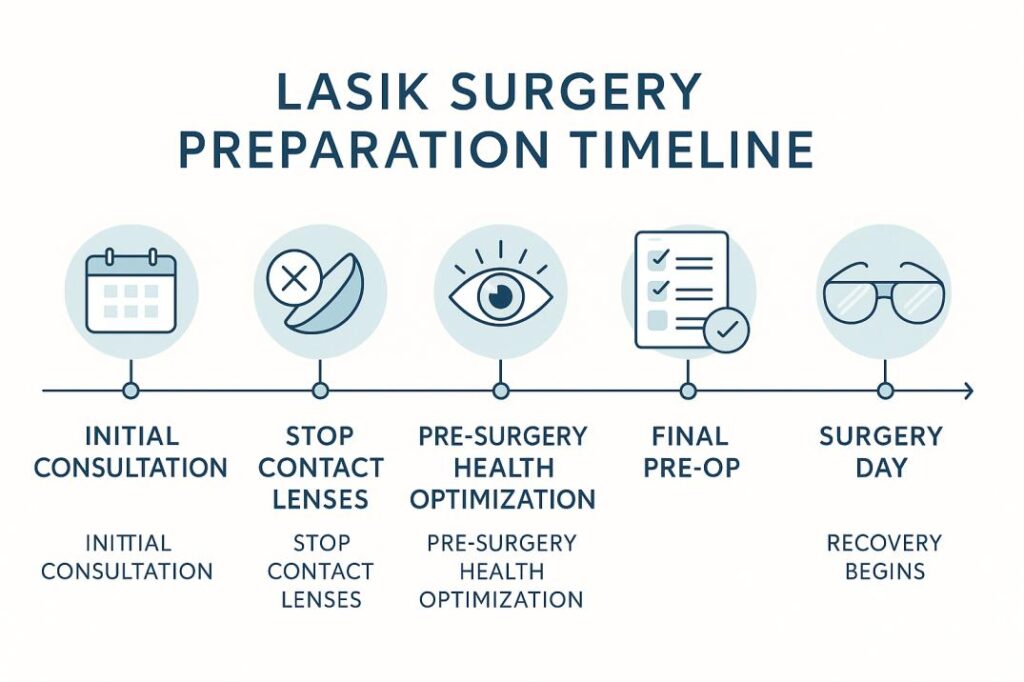Laser Eye Surgery: Step-by-Step Prep
Taking the first step toward visual freedom? Here’s everything you need to know to prepare for your laser eye surgery journey with confidence and achieve the best possible outcomes.
The decision to undergo laser eye surgery represents a life-changing investment in your vision and quality of life. While the procedure itself takes only minutes, proper preparation is the foundation for optimal results and a smooth recovery. At Cannon EyeCare, we believe that well-informed, thoroughly prepared patients achieve the best outcomes from their laser eye surgery experience.
With over 25 years of proven results and millions of successful procedures worldwide, laser eye surgery has transformed from an experimental procedure to the gold standard of vision correction. Modern LASIK technology boasts impressive success rates, with over 90% of patients achieving 20/20 vision or better, and satisfaction rates consistently reaching 96-98%.
Whether you’re a busy Seattle professional tired of the daily hassle of glasses and contacts or someone seeking the freedom to enjoy life’s moments without visual barriers, this comprehensive guide will walk you through every aspect of preparing for your laser eye surgery at Cannon EyeCare.
Understanding Modern Laser Eye Surgery: What Makes Today’s LASIK Different
The Evolution of Laser Eye Surgery Technology
Today’s laser eye surgery bears little resemblance to the procedures performed even a decade ago. Advanced femtosecond lasers have replaced mechanical blades for flap creation, while sophisticated eye-tracking systems ensure precision even with natural eye movements during surgery. These technological advances have significantly reduced complications and improved outcomes for laser eye surgery patients.
Key innovations transforming laser eye surgery in 2025:
- Bladeless femtosecond laser technology for safer flap creation
- Wavefront-guided treatments customized to your unique eye anatomy
- Advanced eye-tracking systems operating at 1740 Hz
- Topography-guided ablation for irregular corneas
- AI-assisted treatment planning for enhanced precision
Why Preparation Matters More Than Ever
While modern laser eye surgery is remarkably safe and effective, your preparation directly impacts your surgical outcome. Proper pre-surgical care ensures accurate measurements, reduces complication risks, and sets the stage for optimal healing. At Cannon EyeCare, we’ve seen how thorough preparation distinguishes patients who achieve outstanding results from those who experience suboptimal outcomes from their laser eye surgery.
The preparation advantage:
- More accurate corneal measurements lead to better vision correction
- Reduced infection risk through proper pre-surgical hygiene
- Faster healing and recovery when guidelines are followed
- Higher satisfaction rates among well-prepared patients
Pre-Surgery Evaluation: Building Your Path to Success
Your Comprehensive Laser Eye Surgery Consultation
Your journey begins with a thorough evaluation at Cannon EyeCare, where our experienced team determines your candidacy for laser eye surgery. This comprehensive assessment goes beyond a basic eye exam to evaluate every factor that influences your surgical outcome.
What to expect during your consultation:
Initial Vision Assessment: We’ll measure your current prescription, assess your eye health, and discuss your visual goals and lifestyle needs.
Advanced Diagnostic Testing: State-of-the-art equipment maps your corneal topography, measures corneal thickness, and evaluates tear film quality to ensure you’re an ideal candidate.
Medical History Review: Our team carefully reviews your health history, medications, and any conditions that might affect healing or surgical outcomes.
Lifestyle Evaluation: We consider your profession, hobbies, and daily activities to recommend the most appropriate treatment approach.
Understanding Candidacy Requirements
Not everyone is an ideal candidate for laser eye surgery, and understanding these requirements helps set realistic expectations for your procedure at Cannon EyeCare.
Ideal candidates typically have:
- Stable prescription for at least one year
- Corneal thickness within safe parameters
- Good overall eye health
- Realistic expectations about outcomes
- Age 18 or older (preferably 21+)
Factors that may affect candidacy:
- Severe dry eye syndrome
- Thin corneas or irregular corneal shape
- Certain autoimmune conditions
- Pregnancy or nursing
- Extreme refractive errors
The Critical Contact Lens Discontinuation Period
Why Stopping Contact Lenses is Essential
One of the most important preparation steps involves discontinuing contact lens wear well before your surgery. Contact lenses temporarily reshape your cornea, and these changes can persist for weeks after removal. Accurate corneal measurements are crucial for surgical planning, making this step non-negotiable.
Contact lens discontinuation timeline:
- Soft daily contacts: Stop wearing 1 week before surgery
- Soft extended-wear contacts: Discontinue 2 weeks prior
- Toric lenses (for astigmatism): Remove 2-3 weeks before
- Rigid gas permeable (hard) contacts: Stop 4-6 weeks prior
- Specialty lenses: May require longer periods – consult your surgeon
Managing Life Without Contacts
For many patients, the contact lens discontinuation period presents the biggest preparation challenge. Here’s how to make this transition easier:
Practical strategies:
- Ensure your backup glasses prescription is current
- Consider purchasing a stylish new frame to make glasses more appealing
- Use this time to appreciate how much easier life will be without vision correction
- Plan the timing around your schedule to minimize work or social disruption
Professional considerations for Seattle workers:
- Tech professionals should plan around important presentations
- Healthcare workers may need to adjust their schedules
- Anyone in customer-facing roles should time the transition appropriately
Pre-Surgery Lifestyle Modifications
Optimizing Your Health for Surgery
The weeks leading up to your laser eye surgery provide an opportunity to optimize your overall health, supporting better healing and outcomes.
Nutritional preparation:
- Stay well-hydrated to support healthy tear production
- Consume foods rich in omega-3 fatty acids for eye health
- Avoid excessive alcohol consumption, which can affect healing
- Consider vitamin C and zinc supplements (with physician approval)
Sleep and stress management:
- Aim for 7-8 hours of quality sleep nightly
- Practice stress-reduction techniques like meditation or deep breathing
- Avoid excessive eye strain from prolonged screen time
- Take breaks using the 20-20-20 rule (every 20 minutes, look at something 20 feet away for 20 seconds)
Medication and Supplement Considerations
Certain medications and supplements can affect healing or increase bleeding risk. Always consult with both your LASIK surgeon and primary care physician before making any changes.
Medications to discuss with your surgeon:
- Blood thinners (aspirin, warfarin, etc.)
- Immunosuppressive medications
- Hormonal treatments
- Acne medications (especially isotretinoin)
Supplements that may need adjustment:
- High-dose vitamin E
- Fish oil supplements
- Herbal supplements like ginkgo biloba
- Anti-inflammatory supplements
The Week Before Surgery: Final Preparations
Establishing Your Recovery Environment
Creating a comfortable, clean recovery space sets the stage for optimal healing and comfort during your initial recovery period.
Recovery space essentials:
- A comfortable chair or bed for resting with your head elevated
- Easy access to prescribed eye drops and medications
- Entertainment options that don’t strain your eyes (audiobooks, podcasts)
- Healthy, easy-to-prepare meals and snacks
- A humidifier to maintain comfortable air moisture
Pre-Surgery Hygiene Protocol
The days leading up to surgery require special attention to eye hygiene to minimize infection risk.
- Gently clean your eyelashes with baby shampoo or a recommended cleanser
- Remove all eye makeup and avoid using it for 24-48 hours before surgery
- Avoid using lotions, creams, or perfumes near your eyes
- Don’t rub or touch your eyes unnecessarily
Transportation and Support Arrangements
Essential arrangements:
- Arrange reliable transportation to and from the surgery center
- Plan for someone to drive you for the first 24-48 hours post-surgery
- Consider having a friend or family member available for the first day
- Confirm all appointment times and locations
Day of Surgery: What to Expect
Pre-Surgery Preparation
Your surgery day begins several hours before the actual procedure with important preparation steps.
Morning routine:
- Eat a light, normal breakfast (unless otherwise instructed)
- Take any prescribed pre-medication as directed
- Shower and wash your hair (you may need to avoid getting water in your eyes post-surgery)
- Dress comfortably in loose-fitting clothes that won’t generate lint
- Arrive at the designated time for final preparations
What NOT to do on surgery day:
- Don’t wear eye makeup, perfume, or aftershave
- Avoid woolly or fuzzy clothing that creates lint
- Don’t drink alcohol or take unnecessary medications
- Skip contact lenses (even if your surgery is later in the day)
The LASIK Procedure Timeline
Understanding what happens during your surgery helps reduce anxiety and ensures smooth cooperation with your surgical team.
Typical surgery day schedule:
- Arrival and check-in: 30 minutes for paperwork and final preparations
- Pre-surgical preparation: 15-30 minutes for eye drops and positioning
- Actual laser treatment: 10-15 minutes for both eyes
- Immediate recovery: 15-30 minutes for initial healing assessment
- Discharge: Final instructions and scheduling follow-up care
During the procedure:
- You’ll lie comfortably on a surgical bed with your head properly positioned
- Numbing drops eliminate discomfort during the procedure
- A small device gently holds your eyelids open
- Advanced eye-tracking technology follows your natural eye movements
- The actual laser treatment takes less than 60 seconds per eye
Managing Expectations: Recovery and Results
Immediate Post-Surgery Experience
Understanding what to expect immediately after surgery helps you recognize normal healing versus concerning symptoms.
Normal immediate effects:
- Blurred vision that gradually improves over hours to days
- Feeling of grittiness or foreign body sensation
- Increased light sensitivity
- Mild tearing or watering
- Slight burning or itching sensation
When to contact your surgeon:
- Severe pain that doesn’t respond to prescribed medication
- Sudden worsening of vision
- Signs of infection (increased redness, discharge, fever)
- Persistent severe light sensitivity beyond 48 hours
Recovery Timeline and Milestones
First 24 hours:
- Rest with your eyes closed as much as possible
- Use prescribed eye drops as directed
- Avoid rubbing or touching your eyes
- Most patients see a significant improvement in vision
First week:
- Vision continues to stabilize and sharpen
- Follow all post-operative instructions carefully
- Attend your scheduled follow-up appointments
- Gradually resume normal activities as approved
First month:
- Vision reaches near-final levels for most patients
- Eye comfort normalizes
- Most activity restrictions are lifted
- Continue using prescribed eye drops as directed
Long-term Results and Maintenance
Expected outcomes at Cannon EyeCare:
- Over 96% of patients achieve 20/20 vision or better
- 99% achieve 20/40 vision (legal driving standard)
- Patient satisfaction rates reach 96-98%
- Most patients remain glasses-free for years or decades
Post-Surgery Care: Protecting Your Investment
Essential Recovery Guidelines
Following post-operative instructions isn’t just recommended—it’s essential for achieving optimal results and avoiding complications.
Critical do’s and don’ts:
Do:
- Use prescribed eye drops exactly as directed
- Attend all scheduled follow-up appointments
- Wear protective eyewear when sleeping for the first week
- Keep your eyes well-lubricated with approved artificial tears
- Protect your eyes from bright light with quality sunglasses
Don’t:
- Rub or touch your eyes, even if they itch
- Swim, use hot tubs, or expose eyes to potentially contaminated water for 2-4 weeks
- Engage in contact sports for at least one month
- Use eye makeup for one week post-surgery
- Drive until cleared by your surgeon (usually within 24-48 hours)
Long-term Eye Health Maintenance
Laser eye surgery provides lasting vision correction, but maintaining overall eye health remains important throughout your life.
Long-term care recommendations:
- Annual comprehensive eye exams to monitor overall eye health
- Continue using quality sunglasses for UV protection
- Maintain a healthy lifestyle that supports eye health
- Stay hydrated and follow a nutrition plan rich in eye-healthy nutrients
- Report any significant vision changes to your eye care provider
Recent Scientific Advances Supporting LASIK Safety and Efficacy
Clinical Evidence for Modern LASIK
Recent scientific studies continue to validate the safety and effectiveness of modern laser eye surgery techniques.
Key research findings: A 2024 comprehensive analysis of LASIK outcomes published in ophthalmology journals confirmed that modern LASIK procedures maintain their excellent safety profile, with serious complications occurring in fewer than 0.5% of cases. The study, following over 10,000 patients for up to 12 years, demonstrated that the vast majority of patients maintain their improved vision long-term.
Advanced technology validation: Research published in 2025 examining wavefront-guided LASIK procedures showed significant improvements in visual quality compared to conventional treatments, with patients reporting better night vision and reduced visual aberrations. The integration of artificial intelligence in treatment planning has further enhanced precision and outcomes.
Recent industry statistics: Current data shows that approximately 700,000-800,000 LASIK procedures are performed annually in the United States, with over 20-25 million procedures completed since FDA approval. The procedure maintains a complication rate of less than 1%, making it one of the safest elective surgeries available.
Long-term stability research: A twelve-year follow-up study of conventional LASIK for moderate to high myopia, published in Biomedical Research International, demonstrated excellent long-term safety outcomes, with no vision-threatening complications reported in any cases during the observation period.
Choosing the Right Provider: The Cannon EyeCare Advantage
What Sets Cannon EyeCare Apart
When preparing for laser eye surgery, choosing the right provider is just as important as following pre-surgical guidelines. Cannon EyeCare stands out in Seattle’s competitive market through our unique combination of advanced technology, experienced surgeons, and genuine patient care.
Cannon EyeCare’s commitment to laser eye surgery excellence:
- Board-certified, fellowship-trained surgeons with extensive laser eye surgery experience
- State-of-the-art technology, including the latest femtosecond and excimer lasers
- Comprehensive pre-surgical evaluation and patient education
- Convenient Seattle locations in University Village and Pike Place Market
- Personalized care that reflects our Midwestern hospitality values
Technology and expertise at Cannon EyeCare:
- Advanced diagnostic equipment for precise laser eye surgery treatment planning
- Bladeless laser eye surgery using femtosecond laser technology
- Wavefront-guided treatments customized to your unique eye anatomy
- Comprehensive dry eye evaluation and treatment before surgery
Patient-Centered Care Philosophy
At Cannon EyeCare, we understand that laser eye surgery is both a medical procedure and a life-changing personal decision. Our approach combines cutting-edge technology with the personal attention and care that sets us apart in Seattle’s competitive eye care market.
Our comprehensive approach to laser eye surgery includes:
- Thorough consultation to determine if you’re an ideal candidate
- Detailed explanation of the procedure, risks, and expected outcomes
- Personalized pre-surgical preparation plan
- Surgery performed by experienced, fellowship-trained surgeons
- Comprehensive post-operative care and follow-up
Resources and Citations
Key Research and Data Sources Used in This Article
1. LASIK Success Rates Statistics (2025) – Vision Center
https://www.visioncenter.org/resources/lasik-success-rate-statistics/
This comprehensive 2025 analysis provided current LASIK success rates, showing that over 90% of patients achieve 20/20 vision or better, with patient satisfaction rates reaching 96-99%. The source also confirmed that approximately 700,000-800,000 LASIK procedures are performed annually in the United States.
2. LASIK Eye Surgery – Mayo Clinic
https://www.mayoclinic.org/tests-procedures/lasik-eye-surgery/about/pac-20384774
Mayo Clinic’s authoritative medical resource provided essential information about LASIK candidacy requirements, preparation guidelines, and what patients can expect before, during, and after surgery. This source informed our sections on medical considerations and recovery expectations.
3. What Should I Expect Before, During, and After Surgery? – FDA
https://www.fda.gov/medical-devices/lasik/what-should-i-expect-during-and-after-surgery
The FDA’s official guidance on LASIK surgery provided a regulatory perspective on safety, preparation requirements, and post-operative care. This source supported our contact lens discontinuation guidelines and surgery day preparation recommendations.
Your Path to Visual Freedom Starts Here
Preparing for laser eye surgery at Cannon EyeCare means partnering with a team that combines advanced technology, extensive experience, and genuine care for your vision and comfort. By following the comprehensive preparation guidelines outlined in this guide, you’re setting yourself up for the best possible surgical experience and visual outcomes.
The investment in proper preparation pays dividends in faster healing, better results, and higher satisfaction with your laser eye surgery experience. Every step you take to prepare thoroughly brings you closer to the visual freedom you’ve been dreaming of.
Ready to take the next step? Schedule your comprehensive laser eye surgery consultation at Cannon EyeCare today. Our experienced team will evaluate your candidacy, answer all your questions, and create a personalized preparation plan that sets you up for success with your laser eye surgery.
FAQs
-
-
Stop wearing contact lenses and switch to glasses for at least one week before surgery.
-
Keep your eye area clean and makeup-free.
-
Follow any personalized instructions from your doctor
-




